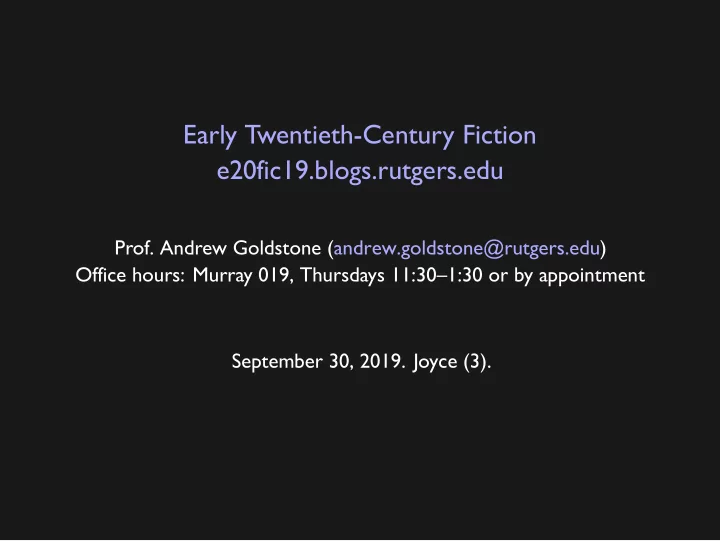

Early Twentieth-Century Fiction e20fic19.blogs.rutgers.edu Prof. Andrew Goldstone (andrew.goldstone@rutgers.edu) Office hours: Murray 019, Thursdays 11:30–1:30 or by appointment September 30, 2019. Joyce (3).
review: quotation direct —I have amended my life, have I not? he asked himself. (129) indirect The priest had answered that Victor Hugo had never written half so well when he had turned against the church as was he had written when he was a catholic. (132) free indirect Was it their colours? (140) U.C.P. Disheartened, he raised his eyes toward the slowdrifting clouds, dappled and seaborne. (141)
representation He would kneel and pray with others and be happy. (120) metarepresentation Stephen believes that he will pray with others and be happy. 2nd-order metarepresentation Joyce intends us to be skeptical of Stephen’s belief that he will pray with others and be happy. difficulties: irony Verbal irony consists in echoing a tacitly attributed thought or utterance with a tacitly dissociative attitude. (272) Deirdre Wilson and Dan Sperber, “Relevance Theory,” in The Handbook of Pragmatics , ed. Laurence Horn and Gregory Ward (Oxford: Blackwell, 2004), 272.
difficulties: irony Verbal irony consists in echoing a tacitly attributed thought or utterance with a tacitly dissociative attitude. (272) Deirdre Wilson and Dan Sperber, “Relevance Theory,” in The Handbook of Pragmatics , ed. Laurence Horn and Gregory Ward (Oxford: Blackwell, 2004), 272. representation He would kneel and pray with others and be happy. (120) metarepresentation Stephen believes that he will pray with others and be happy. 2nd-order metarepresentation Joyce intends us to be skeptical of Stephen’s belief that he will pray with others and be happy.
irony as critique Every thought, word and deed, every instance of consciousness could be made to revibrate radiantly in heaven: and at times his sense of such immediate repercussion was so lively that he seemed to feel his soul in devotion pressing like fingers the keyboard of a great cash register and to see the amount of his purchase start forth immediately in heaven, not as a number but as a frail column of incense or as a slender flower. (124–25)
possessing language He thought: —The language in which we are speaking is his before it is mine. How different are the words home, Christ, ale, master , on his lips and on mine! I cannot speak or write these words without unrest of spirit. His language, so familiar and so foreign, will always be for me an acquired speech. I have not made or accepted its words. My voice holds them at bay. My soul frets in the shadow of his language. (159) tundish : tun (OE tunne ) + dish (OE disc ): a funnel “English and good old blunt English too” (212)
I translate it so: Three things are needed for beauty, wholeness, harmony and radiance. —The connotation of the word [ claritas ], Stephen said, is rather vague….You see that it is that thing which it is and no other thing. The radiance of which he speaks is the scholastic quidditas , the whatness of a thing. This supreme quality is felt by the artist when the esthetic image is first conceived in the imagination. (179) aesthetics
aesthetics I translate it so: Three things are needed for beauty, wholeness, harmony and radiance. —The connotation of the word [ claritas ], Stephen said, is rather vague….You see that it is that thing which it is and no other thing. The radiance of which he speaks is the scholastic quidditas , the whatness of a thing. This supreme quality is felt by the artist when the esthetic image is first conceived in the imagination. (179)
But, temporal or spatial, the esthetic image is first luminously appre- hended as selfbounded and selfcontained upon the immeasurable back- ground of space or time which is not it. (178, qtd. by L.K., tagging “he’s talking about a basket”)
epiphany By an epiphany he meant a sudden spiritual manifestation, whether in the vulgarity of speech or of gesture or in a memorable phase of the mind itself. He believed that it was for the man of letters to record these epiphanies with extreme care, seeing that they themselves are the most delicate and evanescent of moments…. —Then all at once I see it and I know at once what it is: epiphany….It is just in this epiphany that I find the third, the supreme quality of beauty [ claritas ]. ( Stephen Hero [ Portrait draft, ca. 1906], 211)
what is epiphanized? A skull appeared suspended in the gloom of the doorway. A feeble crea- ture like a monkey was there, drawn thither by the sound of voices at the fire. (56–57) Discussion Compare the early “epiphany” with the related passage from Portrait . How does the novel version differ from the free-standing vignette? What is revealed or “radiant” in either version? What kind of beauty is this?
from epiphany to leitmotif ▶ ivory hands (“She had put her hand into his pocket,” 43, qtd. by J.W.) ▶ flame (on his/her cheek) ▶ he fell ▶ swish of the soutane ▶ drops ▶ E. ▶ …
next ▶ think about structure
Recommend
More recommend